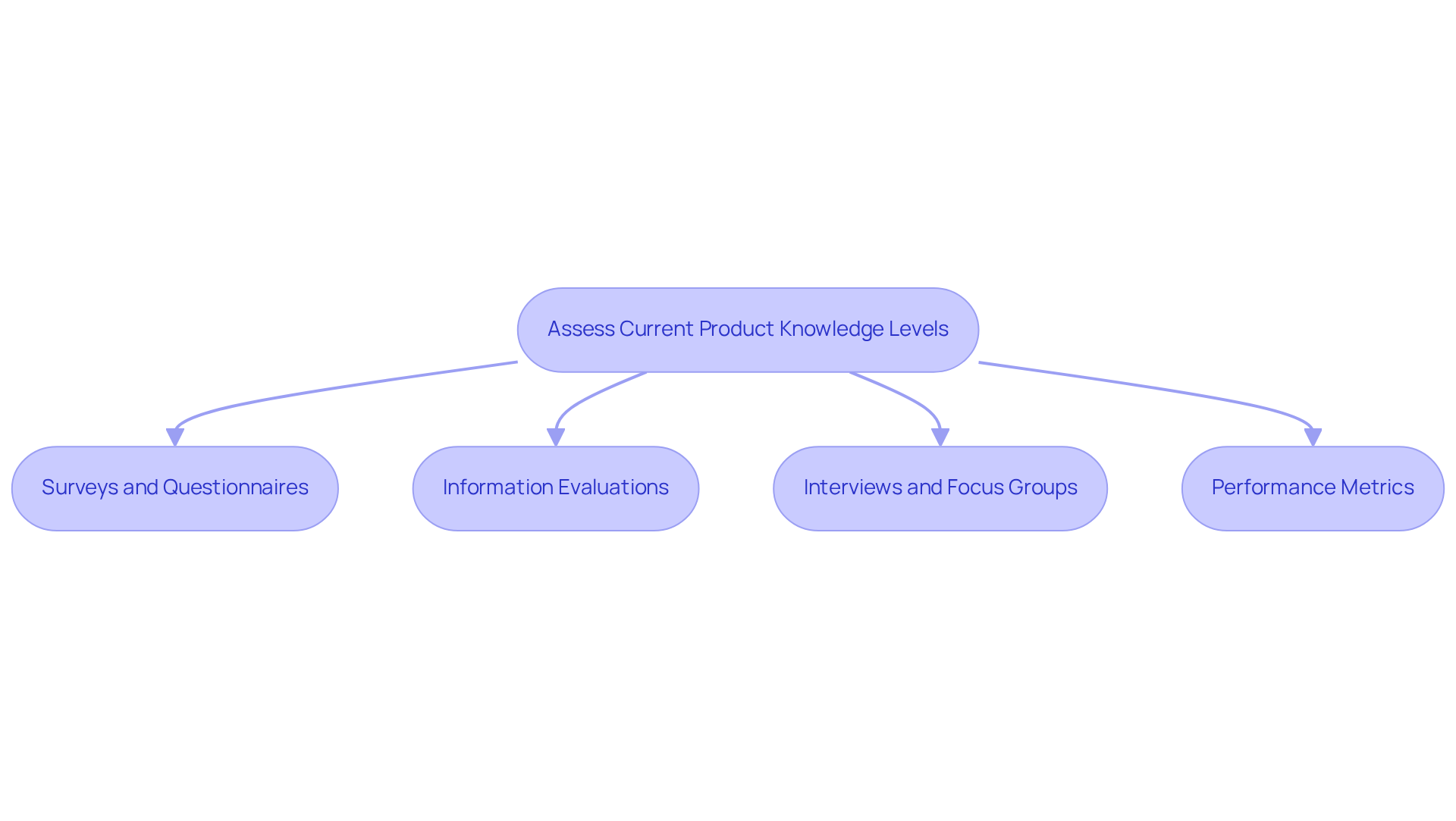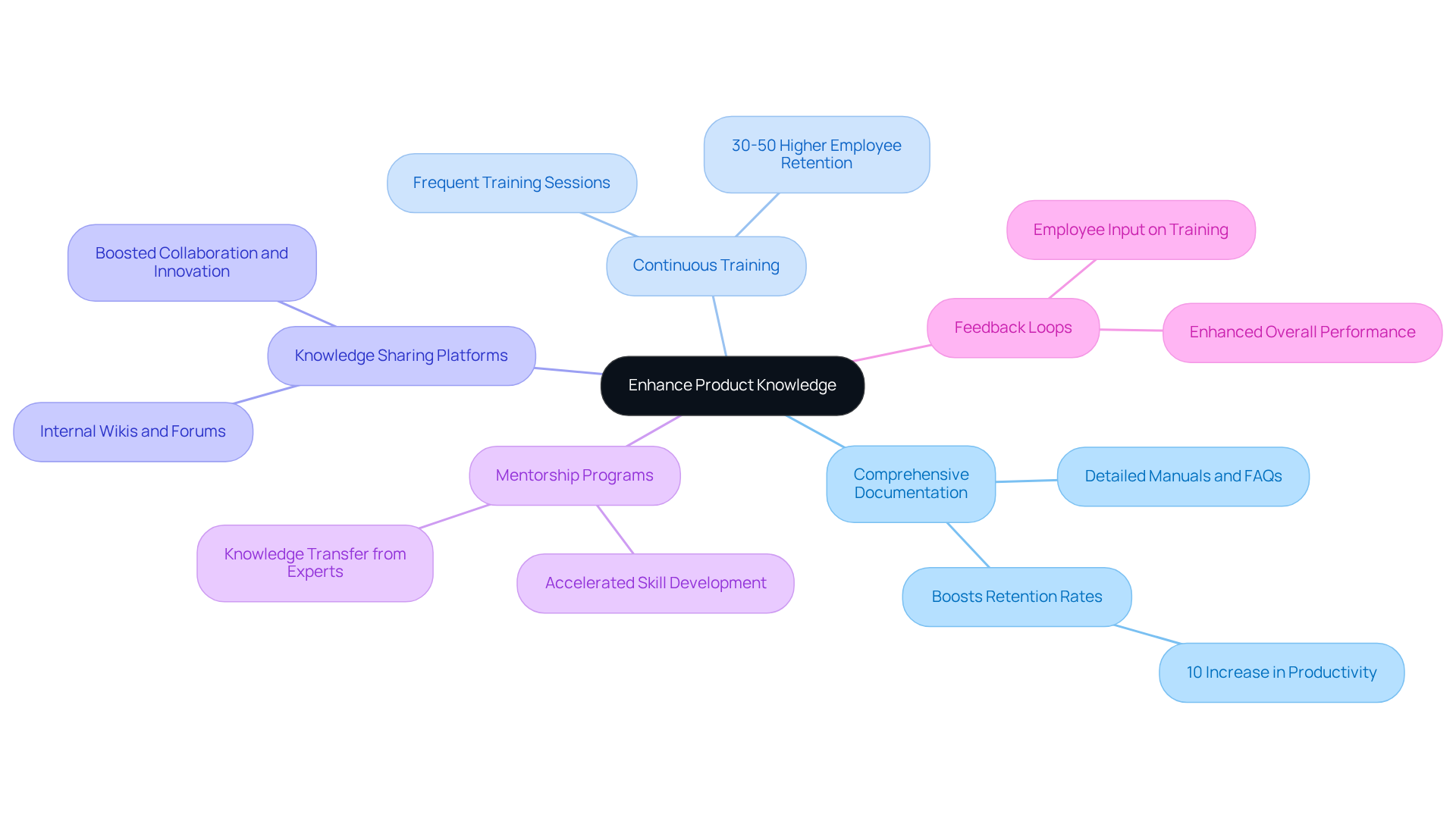
Knowledge Management through Documentation
|
October 19, 2025
|
Define Product Knowledge: Steps to Enhance Team Efficiency
Overview
You might be wondering what product knowledge really means. Well, it’s all about having a solid grasp of a product's features, benefits, and uses. This understanding is key to boosting your team's efficiency and keeping customers happy. When you have effective product knowledge, it leads to better interactions with customers, enhances team collaboration, and helps everyone make informed decisions. Ultimately, this can drive productivity and support business growth. So, let’s dive into how this all works!
Key Highlights:
- Product knowledge encompasses understanding features, benefits, and practical uses of a product.
- Effective product knowledge leads to better customer interactions, enhancing satisfaction and loyalty.
- Collaboration improves when teams share product knowledge, reducing misunderstandings.
- Knowledgeable teams can make informed decisions, driving innovation and business growth.
- Streamlined onboarding processes benefit from comprehensive product knowledge, increasing retention rates.
- Strategies to assess product knowledge include surveys, quizzes, interviews, and performance metrics.
- Creating detailed documentation and continuous training enhances product knowledge retention.
- Knowledge sharing platforms and mentorship programmes foster collaboration and skill development.
- Feedback loops on training materials help adapt programmes to meet team needs effectively.
Introduction
You might be wondering why understanding a product inside and out is so crucial. Well, it's not just a nice-to-have; it's a must for any team aiming for efficiency and success. Product knowledge goes beyond the technical specs—it's about grasping the features, benefits, and practical applications that really empower teams to communicate effectively and make smart decisions.
So, how can organizations make sure their teams have this essential knowledge? As the gap between what products offer and what customers expect shrinks, the real challenge is figuring out how to define and boost product knowledge to spark collaboration, innovation, and ultimately, drive business growth.
Understand Product Knowledge Fundamentals
You might be wondering how much you really know about the item you’re working with. Well, it’s not just about technical specifications; it’s about understanding its features, benefits, and the contexts in which it shines. For teams to boost efficiency, it’s super important that everyone can define product knowledge clearly. Let’s break it down:
- Features: Knowing what the product does and how it works is key for smooth communication and teamwork.
- Benefits: Recognizing the value the item brings to users or clients helps teams articulate their value propositions effectively.
- Uses: Being aware of the various scenarios where the item can be applied allows teams to leverage its features to the fullest.
To build a solid foundation of knowledge, it is essential to define product knowledge, as this not only improves communication but also empowers teams to make informed decisions about development and client interactions. Did you know that companies with effective information management practices can boost productivity by 10-40%? That’s a pretty significant gain! Businesses that prioritize training on their offerings often see impressive improvements in team performance and client satisfaction. For example, companies using AI-driven personalization in onboarding have reported a 34% increase in employee satisfaction within their first 90 days, plus a whopping 67% faster time-to-productivity. By weaving product expertise into the company culture, organizations can ensure their employees are ready to meet client needs both efficiently and effectively. Plus, 76% of company leaders view information as 'mission critical'—it’s their most valuable asset! This really highlights how crucial it is to define product knowledge for driving business success.

Recognize the Importance of Product Knowledge
Product knowledge is super important for a few key reasons, and you might be wondering why that is:
-
Better Customer Interactions: When teams really know their products, they can handle customer questions like pros and provide personalized solutions. This leads to happier customers! In fact, studies show that 93% of buyers are more likely to return to companies that deliver great service. This really highlights how crucial it is to have skilled people on board to build loyalty.
-
Enhanced Team Collaboration: Imagine if everyone on your team could define product knowledge perfectly—collaboration would be a breeze! This shared knowledge cuts down on misunderstandings and mistakes, making workflows smoother. A study found that companies focusing on knowledge management enjoy 37% higher customer satisfaction ratings, proving that sharing information can really amp up team effectiveness. Plus, SowFlow makes this teamwork even easier by letting teams create SOPs and training materials right in their browser, saving time and boosting efficiency.
-
Smarter Decision-Making: A team that can define product knowledge can make strategic choices based on solid insights, which sparks innovation and keeps them ahead of the competition. Organizations that boost customer satisfaction by 20% can see a 15-25% increase in cross-sell rates, showing how knowledgeable teams can leverage their expertise to drive better business outcomes and revenue growth.
-
Streamlined Onboarding: New hires benefit immensely from having access to a wealth of information, allowing them to hit the ground running and reduce the time it takes to get up to speed. This is vital because companies with effective onboarding processes can improve employee retention rates by up to 25%. With SowFlow's instant SOP creation features, new team members can quickly get acquainted with processes, making their onboarding journey smoother. As Anastasia Masadi, Product Owner, puts it, "SowFlow has been a game changer in the way we document work and deliver to our clients. SowFlow gave me time from my life back.

Assess Current Product Knowledge Levels
To effectively assess how to define product knowledge levels within your team, you might be wondering how to get started. Here are some friendly strategies you can implement:
-
Surveys and Questionnaires: Why not distribute some focused surveys to gauge your team's understanding of the product? Make sure to cover key aspects like features, benefits, and practical applications. With SowFlow, creating and updating surveys is a breeze, keeping your documentation fresh and accessible.
-
Information Evaluations: You could also administer quizzes or tests to see how well your team knows the product. Regular assessments can help highlight knowledge gaps and reinforce learning. Plus, SowFlow's user guide creation tools let you quickly revise quizzes based on the latest product info, ensuring your team stays informed.
-
Interviews and Focus Groups: How about facilitating some discussions with your team members? This can help you gather qualitative insights into their understanding and any challenges they face. It’s a great way to uncover specific skill gaps and foster a culture of continuous improvement. With SowFlow's documentation features, collecting feedback becomes simpler, making it easier to implement changes based on your team's input.
-
Performance Metrics: Don’t forget to check out client feedback and support tickets! They can reveal areas where product understanding might be lacking. By understanding client interactions, you can gain insights into how well your team can define product knowledge in real situations. SowFlow's instant documentation updates can help your team respond more effectively to customer inquiries, boosting overall performance.
By systematically gathering and analyzing this data—and leveraging SowFlow's tools for efficient documentation management—you can pinpoint and address specific knowledge gaps, ultimately enhancing your team's efficiency and performance. Now, doesn’t that sound like a plan?

Implement Strategies to Enhance Product Knowledge
To define product knowledge within your team, you might be wondering how to get started. Here are some friendly strategies to consider:
-
Create Comprehensive Documentation: Think about developing detailed manuals, FAQs, and how-to guides that everyone can easily access. Effective documentation not only serves as a handy reference but also helps to define product knowledge and boost retention rates. Did you know that well-documented processes can lead to a 10% increase in productivity?
-
How about arranging continuous training sessions to help define product knowledge and keep the group updated on changes and new features? Research shows that companies with frequent training programs see a 30-50% higher employee retention rate. Continuous learning really fosters engagement and adaptability, doesn't it?
-
Knowledge Sharing Platforms: You could utilize tools like internal wikis or forums to define product knowledge, where team members can share insights, tips, and experiences related to the product. Organizations that encourage this kind of information exchange often see boosted collaboration and innovation, which can enhance problem-solving abilities.
-
Mentorship Programs: Connecting less experienced individuals with product specialists can be a game-changer for knowledge transfer and practical learning. This approach not only speeds up skill development but also helps to define product knowledge, as employees learn from one another's experiences.
-
Feedback Loops: Establishing mechanisms for team members to provide feedback on documentation and training materials is crucial. Companies that actively seek employee input on training effectiveness can adapt their programs to better meet workforce needs, ultimately enhancing overall performance.
By implementing these strategies, groups can cultivate a culture of ongoing learning and enhancement, boosting overall efficiency. As Andrew Carnegie wisely noted, "The only irreplaceable capital an organization possesses is the knowledge and ability of its people." This really highlights the critical role of effective documentation and training in maximizing your team's potential.

Conclusion
You might be wondering why defining product knowledge is so crucial for any team looking to boost efficiency and effectiveness in their operations. Well, having a clear grasp of a product’s features, benefits, and applications not only makes communication smoother but also empowers teams to make informed decisions that can really drive business success. When organizations foster a culture that prioritizes product knowledge, they can see significant improvements in performance and customer satisfaction.
Let’s dive into some key insights from the article that highlight the many benefits of product knowledge. Think about it:
- Improved customer interactions
- Enhanced team collaboration
- Smarter decision-making
- Streamlined onboarding processes
Sounds great, right? Implementing strategies like comprehensive documentation, continuous training, and knowledge-sharing platforms can really help bridge those knowledge gaps and create a more informed workforce. And those statistics? They really drive home the point that investing in product knowledge leads to tangible gains in productivity and employee retention.
Ultimately, prioritizing product knowledge isn’t just a nice-to-have; it’s a strategic necessity for organizations that want to thrive in competitive environments. By taking actionable steps to enhance product understanding within teams, businesses can unlock their full potential and deliver exceptional value to their customers. Embracing this approach could very well be the key to sustainable growth and long-term success!
Frequently Asked Questions
What is product knowledge?
Product knowledge refers to understanding a product's features, benefits, and the contexts in which it can be applied. It is essential for effective communication and teamwork.
Why are features important in product knowledge?
Knowing the features of a product helps teams understand what the product does and how it works, facilitating smooth communication and collaboration.
How do benefits relate to product knowledge?
Recognizing the benefits of a product allows teams to articulate its value propositions effectively, helping to demonstrate the product's worth to users or clients.
What role do uses play in product knowledge?
Being aware of the various scenarios where a product can be applied enables teams to leverage its features to the fullest, enhancing its effectiveness in different contexts.
How can defining product knowledge improve team performance?
Defining product knowledge improves communication and empowers teams to make informed decisions regarding development and client interactions, leading to better overall performance.
What impact can effective information management have on productivity?
Companies with effective information management practices can boost productivity by 10-40%.
How does training on product offerings affect team performance?
Businesses that prioritize training on their offerings often see significant improvements in team performance and client satisfaction.
What are the benefits of AI-driven personalization in onboarding?
Companies using AI-driven personalization in onboarding have reported a 34% increase in employee satisfaction within their first 90 days and a 67% faster time-to-productivity.
Why is product expertise important for organizations?
Weaving product expertise into the company culture ensures employees are prepared to meet client needs efficiently and effectively.
How do company leaders view information in relation to product knowledge?
76% of company leaders view information as 'mission critical,' highlighting its importance as a valuable asset for driving business success.
👍
What others are liking
5 Steps to outline your ideal documentation structure
5 MINS READ
Where to start the your journey of mapping out your ideal documentation structure, aligning it with the very heartbeat of your organization?
Defining a winning level of detail in your process
3 MINS READ
What is too much detail, and what is too little? This article described in that winning level detail about what detail is enough.





